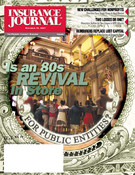Citing growing numbers of collision, uninsured motorist, and property damage liability claims in the state, Texas Insurance Commissioner Jose Montemayor approved an increase in private automobile benchmark rates. While benchmark rates will increase by a statewide average of 5.3 percent, not all drivers may experience a change in their auto policies.
“The overall average rate change was primarily driven by increases in the cost of uninsured motorist coverage, up 23.5 percent; property damage liability insurance, up 11.9 percent; and collision insurance, up 7.8 percent,” Montemayor said.
The average 5.3 percent increase in the benchmark rates is below the 6.9 percent increase recommended by the insurance industry, the state administrative law judges’ recommendation of a 5.8 percent increase, and the proposal of a consulting actuary who advocated a 5.7 percent increase on behalf of Texas Department of Insurance (TDI) staff. The state’s Office of Public Insurance Counsel recommended increases averaging 5.1 percent.
Montemayor noted that not all Texas drivers’ auto policies will change: “Texas Department of Insurance staff will examine filed rates very closely to make sure they are justified by each company’s individual experience and are fair to consumers.”
New benchmark rates will kick in on Dec. 31, 2001, after which rate-regulated insurers will have 30 days to file their new rates. TDI indicated that an individual company’s rates are based on its own experience and that rates may vary widely from firm to firm.
Companies may use their new rates immediately after they file them if the rates are within a range 30 percent above or below the benchmark rates. They also have the right to delay the effect of their new rates for as long as 60 days after filing them. Filed rates are subject to challenge by TDI actuaries if not supported mathematically by a company’s own claim experience.
Drivers in 20 of the 52 rating territories will have smaller than average increases in their benchmark rates. These include Harris, Dallas, Bexar, Tarrant and El Paso counties, which will benefit from the first updating since the mid-1990s of rating factors that reflect differences in accident claim experience among the territories.
This was the final auto benchmark rate case under a system that required hearings before administrative law judges employed by the State Office of Administrative Hearings. Future hearings will be before the insurance commissioner as the result of House Bill 2102, which was passed by the Legislature earlier this year. TDI recommended the change in an effort to speed up rate cases and keep benchmark rates more closely related, time wise, to the claim experience they are intended to reflect.
TDI noted that benchmark rates for bodily injury liability and comprehensive insurance lines, however, will be reduced by 6.7 percent and 1.8 percent, respectively. Bodily injury liability insurance is a state-required coverage. Comprehensive coverage pays for non-accident losses, such as hail damage, vandalism and auto theft.
Concurrently, Montemayor raised personal auto coverage rates provided through the Texas Automobile Insurance Plan Association (TAIPA) by 9.2 percent. The plan provides basic liability insurance required by Texas law, plus uninsured/underinsured motorist and personal injury protection (PIP) coverage, for Texans whom insurance companies won’t cover voluntarily. Fewer than 0.3 percent of drivers obtain this plan, which provides basic liability coverage required by Texas law, through TAIPA.
In a statement, Rick Gentry, executive director of the Insurance Council of Texas, noted that this auto benchmark rate increase is only the third such increase in ten years.
“The statistical evidence was compelling and we are thankful that Commissioner Montemayor agreed that auto rates needed to be increase,” Gentry said. “Increasing rates is never easy, but this decision ensures adequate rates that will allow Texas to remain an attractive place for insurers to invest capital and maintain a viable auto insurance marketplace.”
According to a National Association of Insurance Commissioners study released in May 2001, Texas’ average yearly expenditure for car insurance ranked 19th in the nation, although the state is the second most populous and is home to three of 10 largest cities in the U.S.
Was this article valuable?
Here are more articles you may enjoy.


 Chubb Posts Record Q4 and Full Year P/C Underwriting Income, Combined Ratio
Chubb Posts Record Q4 and Full Year P/C Underwriting Income, Combined Ratio  Winter Storm Fern to Cause Up to $6.7B in Insured Losses
Winter Storm Fern to Cause Up to $6.7B in Insured Losses  Trapped Tesla Driver’s 911 Call: ‘It’s on Fire. Help Please’
Trapped Tesla Driver’s 911 Call: ‘It’s on Fire. Help Please’  Allstate Doubles Q4 Net Income While Auto Underwriting Income Triples
Allstate Doubles Q4 Net Income While Auto Underwriting Income Triples 


